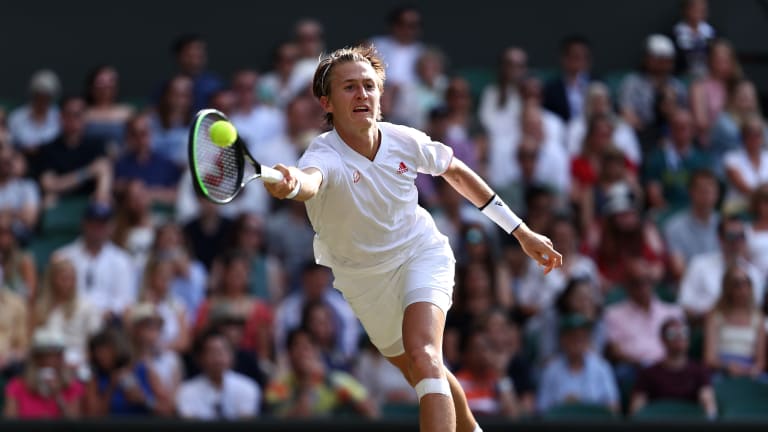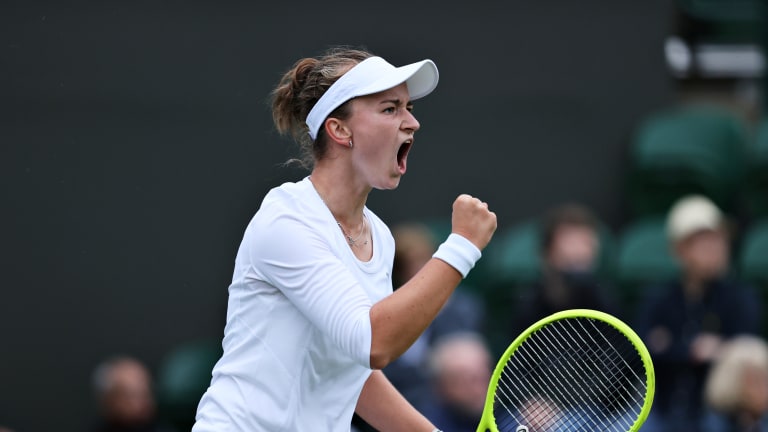The Rally: Manic Monday musings, as Wimbledon begins to weed out its pretenders
By Joel Drucker and Steve Tignor Jul 04, 2021Darren Cahill: Jannik Sinner watches more Carlos Alcaraz matches than he does with any other player
By TENNIS.com Jul 14, 2025Jannik Sinner reignites Carlos Alcaraz rivalry with Wimbledon victory
By Pete Bodo Jul 14, 2025Jannik Sinner reversed his usual pattern against Carlos Alcaraz. It won him Wimbledon
By Steve Tignor Jul 14, 2025Veronika Kudermetova and Elise Mertens win women's doubles title at Wimbledon
By Associated Press Jul 13, 2025Joy to the World: What Carlos Alcaraz has, and what we are enjoying
By Peter Bodo Jul 13, 2025Iga Swiatek keeps surprising herself after Wimbledon title caps "surreal" turnaround on grass
By Steve Tignor Jul 12, 2025Iga Swiatek wins first Wimbledon, sixth Grand Slam title with 6-0, 6-0 rout of Amanda Anisimova
By Ed McGrogan Jul 12, 2025Wimbledon men's final preview: Will Carlos Alcaraz, Jannik Sinner share another epic?
By Steve Tignor Jul 12, 2025Julian Cash, Lloyd Glasspool become first all-British pair to win Wimbledon men's doubles title since 1936
By Associated Press Jul 12, 2025The Rally: Manic Monday musings, as Wimbledon begins to weed out its pretenders
It could be a very happy birthday for fast-rising Sebastian Korda; on the women's side, virtually everyone has a legitimate chance to win the title.
Published Jul 04, 2021
Advertising
INTERVIEW: Sebastian Korda will turn 21 on Manic Monday, and is a quick study at Wimbledon.
Hi Joel,
The grass seems to have firmed up, the Nick Kyrgios show has come and gone, Roger Federer has shaken off the rust, and British tennis fans have waved good-bye to one tennis hero in Andy Murray, and welcomed a new one in Emma Raducanu. Now that the stories of the first week are in the rear-view mirror, it’s time to get down to the business of finding out who’s going to win Wimbledon. That begins with Manic Monday—the last Manic Monday—when all 16 fourth-round singles matches are staged on the same day.
That’s obviously a lot of matches. More important, there are several good and interesting contests within those 16. They’re made more interesting by the fact that virtually everyone on the women’s side has a legitimate chance to win the title. I like that you can take any player currently in the draw, imagine her holding the Wimbledon winner’s plate, and know that it could actually happen.
The presence of Novak Djokovic means the men’s event is a little less wide open, but there are still half a dozen players in the bottom half—which includes Roger Federer, Alexander Zverev, Matteo Berrettini and Felix Auger-Aliassime—with a legitimate shot at making the final.
Two men’s matches that intrigue me right off the bat are Sebastian Korda vs. Karen Khachanov, and Zverev vs. Auger-Aliassime. Korda, who will be playing on his 21st birthday, is making his Wimbledon debut; how far can he go? To me, he has the composure and outward confidence of a player who has already won the thing five times, and is the favorite to do it again. Whether or not he actually feels that way, he has the complete game to back that confidence up. As for Zverev vs. Auger Aliassime, this is a match between two potential future Slam champions. As of now, Zverev is a step or two ahead of FAA, and is 3-0 in their head-to-head. We’ve seen FAA struggle on this type of stage before. I’ll be interested to see if he shows any progress.
On the women’s side, two matches also stand out right away: Coco Gauff vs. Angelique Kerber, and world No. 1 Ash Barty vs. newly crowned major champion Barbora Krejcikova. Gauff and Kerber is a high-profile inter-generational duel; Gauff is playing with more force and clarity every week, while Kerber seems to be hanging in her matches as if she thinks this will be her last good chance at a fourth major title. As for Barty-Krejcikova, it will be interesting to see the Czech put her current form—she has won 15 straight matches—up against the world’s best.
Joel, what do you think of those matchups, and what else are you looking forward to on Monday?
Advertising

How far can Korda go? The self-assured American will face Karen Khachanov in a compelling fourth-rounder.
© Getty Images
Hi Steve,
Often on Manic Monday, I’ve found the women more compelling than the men. Perhaps that’s because they’re playing best-of-three sets, a compact format ideal for grazing at this day-long tennis smorgasbord.
Barty-Krejcikova is a stylistic delight, pitting two Roland Garros champions with richly textured all-court games—each has won doubles majors—that in large part are even more suited for grass. Dare we call this a 21st-century version of a match between Evonne Goolagong and Martina Navratilova? Call it a party game: plenty of chips and dips. Here’s hoping it’s also dramatic, and that they bring out the best in one another.
As you said, Gauff-Kerber is a classic generational tussle between the ascending youth and the crafty veteran. Ever since she beat Venus Williams at Wimbledon, Gauff has impressively shown an ability to play the ball instead of the opponent’s resume. It will be fascinating to see how she grapples with Kerber’s lefty array, particularly the German’s forehand and foot speed. That said, Kerber’s serve has never been particularly impressive—and lefty slice in the ad court will go straight to Gauff’s strong backhand.
And then there’s a vivid showcase of contemporary women’s tennis: Iga Swiatek versus Ons Jabeur. Each of these two is superb at disruption, Swiatek with precision and tons of power, Jabeur with variety and traces of power. I’m not quite sure why I’m saying this, but my hope is that no one gets hurt in this match.
I’m also interested to see how all-courter Karolina Muchova plays. She reached the quarters here two years ago. And I’ll also put in a thought for Madison Keys, perhaps at last in the right place for the kind of strong Wimbledon effort long expected of her.
Like you, the men’s match that jumps out at me features Korda and Khachanov. Korda was impressive versus Dan Evans on Friday, not just in the stroke department, but also with his calm demeanor. Khachanov is a completely different player, a big hitter par excellence who slumped for a while but has regained his form. As you mentioned, Monday is Korda’s 21st birthday, so perhaps he’s destined for excellence at Wimbledon the way such birthday boys as Jimmy Connors and Rafael Nadal have been at the US Open and Roland Garros, respectively.
Steve, as we track all the tennis that day, how do you best keep up with all of it?
Advertising

Barbora Krejcikova, the French Open champion, has won 15 straight matches.
© Getty Images
Joel,
On a couple of occasions when I’ve been on the grounds at Wimbledon, I’ve tried to catch a little bit of all 16 matches on Manic Monday—maybe you’ve done the same at some point. It was as fun and exhausting as it sounds, but the best part for me was the chance to see different journalists I knew from different parts of the world watching the players they were covering. There was an Italian friend on one court, reporters I knew from China at another, Brits at a third, and fellow Americans at other locations. I’ve never felt like such a global citizen.
This year, of course, there won’t be any globetrotting for me. I’ll be tuned to the ESPN app on my Roku like everyone else, flipping maniacally from one court to the next. It’s actually a much less tiring and time-consuming way of doing essentially what I did at Wimbledon. Manic Monday is hardly an ideal way to showcase the round of 16 at a major; there are too many things happening at once to spend much time with any match. I don’t mind that, starting in 2022, the fourth round will be spread out, in more sane fashion, over the middle Sunday and Monday. Yet all of that said, the too-muchness of Manic Monday is a thrill for any tennis fan.
You mention Muchova and Keys. I’ve been thinking this week that, despite the fact that they have two very different playing styles, I could see either of them as Wimbledon champions. Muchova has the all-court skills and steady demeanor, and Keys has the raw power. Of course, I’ve said that about Keys many times before, only to see her bow out in surprising fashion, because she can’t get through two weeks without having a bad day.
Let me finish by mentioning a couple of players I left out at the start, who could be a factor in the second week.
I’ll be interested to see, if the two matches end up happening in the quarterfinals, what Andrey Rublev can do against Djokovic, and Daniil Medvedev can do against Federer. Rublev may have the best chance of anyone of putting a scare into Djokovic; and Medvedev vs. Federer is a fascinating match-up to imagine. Lastly, how about 22-year-old Russian Ludmilla Samsonova? She’s ranked 65th, and is relatively unknown. But she has won 10 straight matches on grass, and she looked particularly fierce against Sloane Stephens in the third round. I’ll be curious to see how she does against Karolina Pliskova next, and how far she can make her winning streak last.
How about you Joel, how will you watch on Monday?
Advertising
I could see either of them as Wimbledon champions. Muchova has the all-court skills and steady demeanor, and Keys has the raw power.
Steve,
Keeping track of everything that day has always been a trial-and-error process, in the hands of luck, weather and where the dramatic tennis surfaces. Consider Wimbledon’s round of 16 Monday akin to a three-act play, a 24-hour, compressed replication of the experience of following an entire tournament.
For me, this day goes best when I can start it all off with an engaging match and intensely absorb a great deal of the tennis nutrients that make Wimbledon so extraordinary—the opportunism of the grass, the adjustments each player has to make versus the opponent and the resultant tension, the possibility of a trip to the quarters, and, as can happen, even those intermittent patches of rain that can drastically alter the ebb and flow for players and spectators alike.
Once a single match is tucked away, then I feel I can pick and choose more freely, as if everything else was a bonus. That thick period of afternoon into early evening is highly random. Is the men’s match on Centre Court actually compelling, or merely a showcase for a marquee player? Is that battle on No. 1 Court headed to a fifth after all? And who’s that player I’ve never even heard of on Court 12? If the beginning day is the Big Bite, then this period is a Silly Scurry. It’s impossible to feel caught up at this point.
Act Three gets underway sometime after 6:00 p.m. local time. By now, several quarterfinal matchups have been determined. Might there also have been an upset? In most cases, the notable names have advanced. And then I realize there’s a match I will not likely have seen a single point of. This might well not be the first time I apologize to Karolina Pliskova and her many fans.
But the day is far from over. At this stage, we’ve bounced all over the grounds and hope to resettle into yet one more suspenseful match. Perhaps there’s one an outer court, seeking to finish before darkness. Or is there some surprise happening on Centre Court?
All these questions make for one appetizing day. Enjoy the feast.